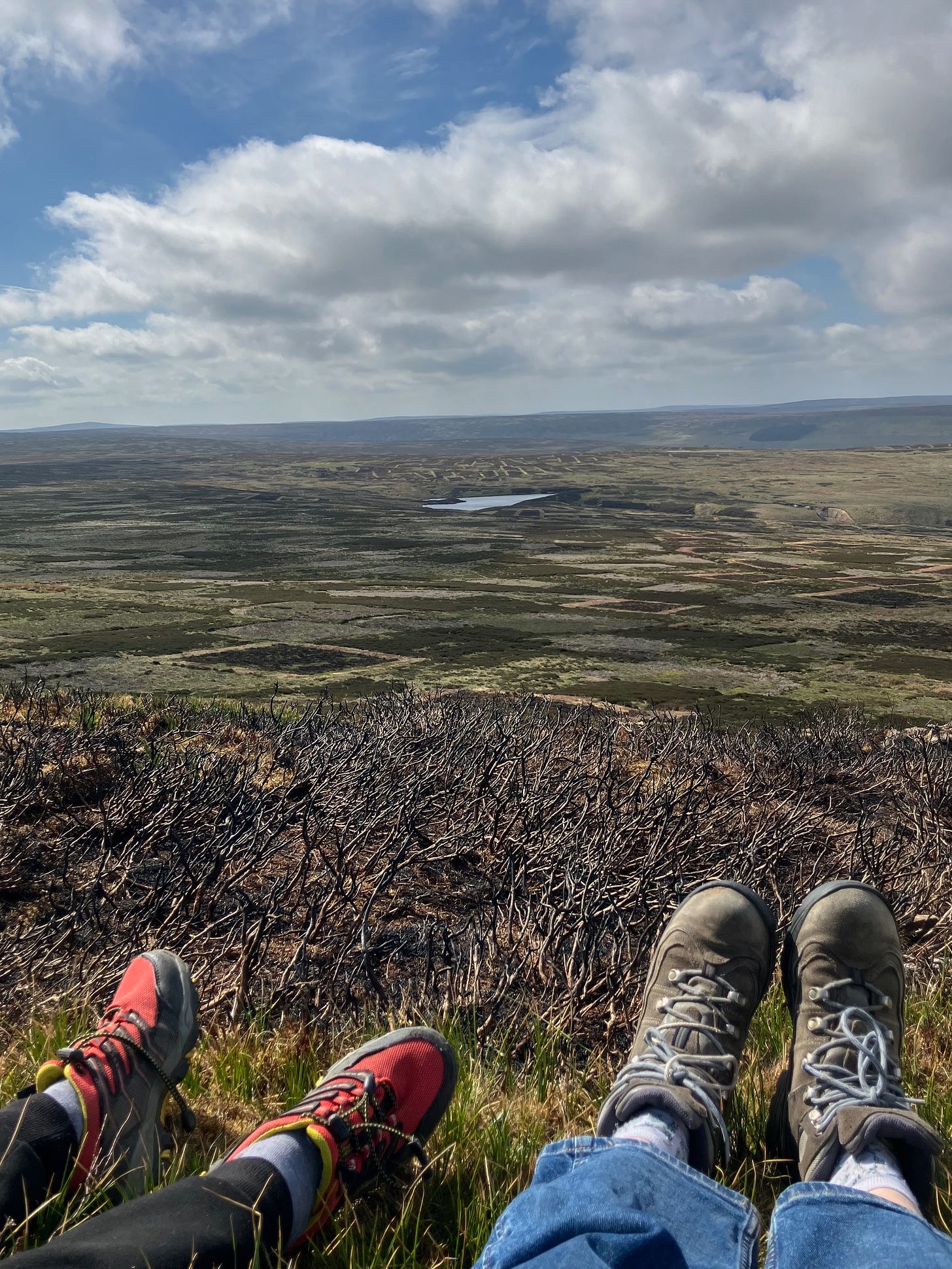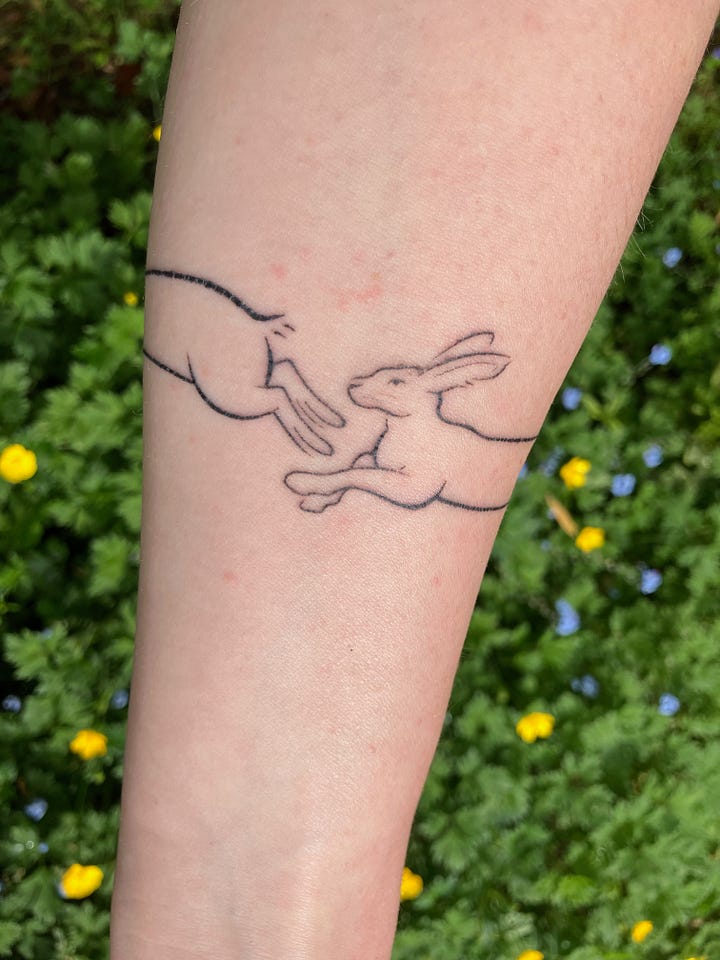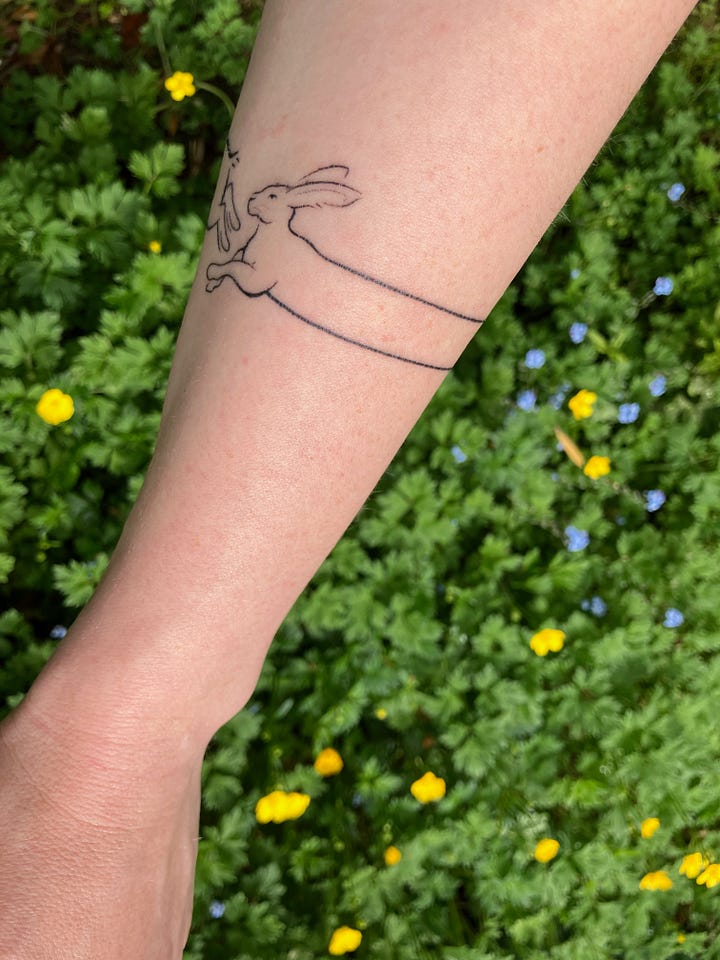Reflect | May
My writing life this month: a season of abundance, writing from the heart rather than the head, imposter syndrome, ghosts and scars, writing into the light
Part 5 of my monthly Reflect posts: a check in with my writing goals for the month that’s ending, where I’m at with the first draft of the memoir project I’m hoping to complete by the end of 2025, and any interesting ideas emerging from what I’ve been writing about.
Well, I’ve cracked this goal setting malarkey because I am 5 for 5 on my writing goals for May 💪 I think it’s a mix of having had more of a sense of flow and ease with the writing this month, alongside getting better at setting realistic but stretchy goals after five months of this practice. I’m also being realistic - I know that this doesn’t mean that I’m going to repeat the trick next mont. In fact, if I follow my usual pattern with my weekly to do list for my day job, I’ll probably set wildly over-confident writing goals for June and fail to meet them all. For now though, I’m going to enjoy a well-earned sense of achievement.
Click through on the note linked above for a reminder of my writing goals in May ⬆️
Write 15,000 words in May
I was pretty accurate in terms of judging how many words I could realistically write this month, and I am feeling smug about it. Look at me knowing my own capabilities! This feels like a big deal, because my usual modus operandi is to over-estimate how much I can get done, and then spiral into a perfectionist crisis when I am unable to achieve what I planned to.
The words I’ve written this month have been for my memoir project and for my Substack publication (blog? newsletter? public journal?). I haven’t written anything for submission this month, either for a competition or for publication. I have however had two successes related to work I’ve submitted in previous months: a piece I submitted to Fieldfare Press, Ghosts on the Stairs, was published at the start of May and I found out that a piece I submitted to motherlore magazine will be included in Issue 4: Becoming, due to be published later this summer.
With both successes, I’ve had brief burst of revelling in the moment - people I don’t know have liked my writing enough to publish it! Submitting something I’ve written feels quite vulnerable and requires some mental tightrope walking. I need to be hopeful and optimistic, to stand by a conviction that what I’ve written is good and worth being submitted, while also internally braced for the possibility that I’ll be unsuccessful. But in both cases I’ve also been amazed at how quickly I compartmentalise the success: it’s great that my work is going to be published, but if that’s something that it’s possible for me to achieve then maybe it’s not really that big a deal, and I should probably go back to swimming in imposter syndrome again.
I’ve also published 3 posts here this month: my regular monthly Compost and Reflect posts, and also a piece written in response to a writing prompt Lily Dunn shared which includes several short slices of life writing based on mapping out my scars.
Scar Tissue | Body Map
This piece was written in response to a creative writing exercise shared by Dr Lily Dunn last month that sparked my interest and led to me setting aside the other pieces of writing I was working on so that I could follow that spark down a very pleasurable rabbit hole! It feels a little more vulnerable, a little less polished than the other pieces I’ve published her…
So that’s 4 posts in total this month, if I include the piece published by Fieldfare Press, and I don’t think this is sustainable. But maybe aiming for 3 posts a month is? My Compost and Reflect posts, which write themselves to an extent, plus a third more freeform piece of memoir or life writing, like this month’s post about my scars or the piece I wrote in March about all of the houses I lived in between birth and age 19. I want to write part 2 of that mini series, covering the places I’ve lived from 20 years old up until the present, so that could be my third post for June.
Reach 33,000 words on the first draft of my memoir
Part way through this month I switched from writing this first draft with half an eye on an imagined future audience (remembering that my aim/dream is for it to one day be a book that will be read by strangers, people who know nothing about me or the events I’m writing about) to writing it just for me - just get the words down, get the feelings down, write in a way that makes sense to me. The audience for the first draft is me. I can worry about - and write for - a wider audience when I’m working on a second draft, editing and adding to this first draft.
Up until now I’ve been writing quite self consciously in a way, focussing on writing material that I think will form part of the finished memoir based on the working structure I mapped out back in January. I’ve been writing to the structure in order to meet a target I haven’t let myself admit out loud to complete the first draft by the end of 2025. This has meant taking a pair of months to write about each month, writing chronologically towards my mum’s death from two directions. So in January I wrote about October 2014 and April 2016, nine months before and nine months after she died. In February it was November 2014 and March 2016, and so on. If I stuck to this plan I should reach July 2015 (the month Mum died) by October, giving me a buffer of two months to accommodate any periods of writers’ block or months when I had less time and space to write (hello school holidays!).
I was beginning to feel stifled by this structure. I’ve been writing mostly in the present tense, in the voice of the Ellen of October 2014 or April 2016 and so on, with some short sections written from the perspective of 2025 me which have been a mixture of present tense and past tense. I was starting to struggle because while I remember some moments/days/weeks in the 18 months either side of Mum’s death really well, others are hazier. I didn’t keep any kind of diary or journal at that time, so in some cases I’m going from brief notes scrawled in my weekly planner, occasional pieces of therapeutic writing (pouring my thoughts and feelings onto the page to get them out of my head), or short pieces of poetry written in the ten years since then. I’ve not always been able to really access or embody the voice of 2014/2015/2016 Ellen.
So this month I’ve found myself writing more as me now, reflecting in the past tense on things that happened ten years ago but also broader themes related to the topic of this memoir. It’s felt looser, less constricting. I’m not sure whether everything I’m writing will make the finished first draft, but I think that it will at least inform it - that the first draft will be richer because of what I’m writing now, even if ultimately I end up cutting it. I feel like I’m thinking aloud on the page, working through ideas physically as well as mentally by writing about them. Selecting the right words to craft sentences that express my thoughts and feelings about hospice care or assisted dying, scans in pregnancy or birth plans.
Previously, I saw the memoir I’m writing as being very specifically about the 18 months between October 2014 and April 2016, with some elements of life before then but very little of my life since. But I’m realising that it doesn’t work like that: the person writing this memoir is living in 2025 so everything I write about what happened ten years ago is informed and shaped by all the things I’ve experienced since then. Writing about how I felt then involves thinking about how my feelings of grief have changed and evolved over the last decade. What has changed? What has stayed the same? And increasingly I want to write about that too. So far it’s emerging as what I’d class more as non-fiction than memoir writing (although the boundary between these different styles of writing is surely fluid and shifting). I’m writing with a wider focus - examining my ideas about life and health, grief and loss, how I think about them, what I think is true - rather than just focusing on my direct experiences of Mum’s illness and death. In many ways, I’m reminded of when I was writing up my PhD thesis in 2007 and 2008. It feels like there’s a similar process of alchemy happening, a distilling of everything I’ve thought and read and found out about a particular topic into a new form.

Start reading through Mum’s notebooks and hospital letters
I have finally started this task! It’s been one of my monthly writing goals for three months now but I’ve kept putting it off. Understandably perhaps: this is a stack of foolscap wallets full of doctor’s letters and hospital appointments related to my mum’s medical treatments from 2013-2015, and notebooks full of her thoughts and fears about those treatments, questions she wanted to ask her consultant, lists of symptoms and dates when they occurred. And all written in her lovely looping handwriting that I love so much, and miss so much. The handwriting that starts to become messier, jagged, more uncertain as the notebooks progress closer and closer towards her death.
But this month I finally felt ready to face this task. I took the plunge during one of Layla O’Mara’s Sitting in the Dark sessions a couple of weeks ago. I made a very conscious choice to draw on the safe space and sense of community that Layla facilitates through these early morning co-writing or co-creating sessions to start reading through my mini-archive of papers and notebooks. And it has been just as rewarding and just as painful as I imagined it would be. So far I have found out where my maternal grandparents and great-grandmother’s ashes are scattered, and set an intention to make a pilgrimage to Liverpool sometime this year to visit them. I’ve confirmed the dates of Mum’s radiotherapy and chemotherapy treatments. I’ve been able to follow the saga of her various symptoms, follow up scans, and her intermittent battles with the DVLA over her legal right to drive following her first brain surgery in 2003.
I’m still building up to the final notebooks, the ones that Mum used to communicate with us after the tumour had robbed her of the ability to speak. They go right up until late June or early July 2015, when she went into hospice care. A quick flick through shows me that these notebooks document her physical decline over the final nine months of her life; her handwriting becomes less clear, full sentences and punctuation slowly giving way to scattered words that require increasing interpretation by the reader to work out what she was trying to say. I’m not quite ready to face those notebooks yet with my researcher hat on - the bereaved daughter hat is still too difficult to take off.
I also discovered that amongst the papers I brought back from my dad’s house after Christmas I managed to pick up a journal Mum kept in 1994, when she was roughly my age now and I was the same age as my eldest son. This has sparked a lot of internal debate self-examination around whether it is ok for me to read it. I remain conflicted over the ethical implications of doing so, but I have started to read the journal. At heart I am a historian: I learn about and understand the past by studying written records and part of this memoir writing project is focussed on my attempt to reconnect with Mum. Now that I know that this journal exists, I would find it very hard to set it aside, not to read it. I can’t imagine destroying it either - in the same way that I can’t imagine destroying the many, many notebooks still on a shelf in Dad’s house that are filled with Mum’s notes from yoga teacher training days or lesson plans for the yoga classes she taught.
She’s there on the pages of this journal, a version of Mum from long before the brain tumour entered her life, and ours. Her familiar handwriting, her voice, her thoughts and fears and feelings. And I’m there too, in brief snatches; Mum’s perception of 12 and 13 year old Ellen. Where I was, what I was doing, what I was interested in. It’s fascinating to read her account of an argument between Dad and me - an argument that I have no memory of, perhaps because it was one among many of the arguments we started to have with increasing frequency throughout my teens and early 20s. But my decision to read Mum’s journal is bringing up lots of wider questions: do I tell Dad that I’m reading it? Should I? Should I let him read it, if he wants to? Should I talk to him about the things Mum writes about in it, her account of the things that were happening in their relationship 30 years ago?
Participate in Layla O'Mara’s Sitting in the Dark sessions
I really enjoy and value these weekly early morning sessions, sharing space with a group of women as we all work together but apart on our different projects. This is the third time Layla has offered these sessions, and the first time that they’ve taken place during daylight. Previously, I’ve risen in the darkness, stumbled downstairs to light a candle and write in my notebook in the shadows, watched the sky outside the window slowly shifting towards dawn. This month, dawn happened long before I get out of bed and I’ve been writing in early morning sunshine, listening to a riot of birdsong and watching the world becoming impossibly greener and greener every week.
It’s been fascinating to notice the differences between what I’m writing - in how I’m writing - in these sessions compared to the previous ones. Writing in daylight feels more clarifying somehow. I’m more focused on examining and unpicking - understanding - the things I’m writing about, whereas writing in the dark was more about exploring and uncovering my thoughts and feelings. In a way I miss the softer, darker writing mindspace of the autumn and winter rounds of these sessions, but I think there’s value to be had in writing in the daylight too. And I know that the dark mornings will return as the seasons continue to shift through summer and into autumn.
Get a new tattoo
And speaking of cycles, I finally got the tattoo I’ve been dancing around the edges of committing to for at least a year:


It’s a hare, endlessly looping around my left forearm, its elongated body forming a simple bracelet. It’s a reminder of the hare I watched through the kitchen window of the holiday cottage we were staying in on the morning we scattered my mum’s ashes. That moment has come to hold many layers of meaning and symbolism for me, and it feels good and right to have a permanent reminder of it inked into my skin as I approach the tenth anniversary of Mum’s death. The tattoo represents the universal truth that I find both comforting and intensely painful: this too shall pass. But it also reminds me that time can be understood as cyclical rather than linear. Sometimes it doesn’t feel like the past is truly gone - it’s close by, just out of reach but so close I can almost touch it.








Ellen, good for you for taking this journey to write your memoir. I've been writing my memoir for years and kept putting it away. I'm finally ready to explore it deeper and share on Substack. It surrounds the journey around losing myself when I lost my 13-year-old son and how journaling was that pause place to hold me as I navigated grief. When you shared about not knowing what for you or the public eye, that resonated. I've kept a journal for years and much of what I write is for me. But I'll take a thread and unravel it on the page to make meaning for myself. Hopefully that meaning will resonate with others. Journaling supports me as I go deeper into my personal story and how I'm on a healing journey. Would love to connect and hear more! Keep at it!❤️